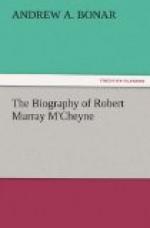On resuming his labors, he found a residence in Carronvale. From this pleasant spot he used to ride out to his work. But pleasant as the spot was, yet being only partially recovered, he was not satisfied; he lamented that he was unable to overtake what a stronger laborer would have accomplished. He often cast a regretful look at the collieries; and remembering them still at a later period, he reproached himself with neglect, though most unjustly. “The places which I left utterly unbroken in upon are Kinnaird and Milton. Both of these rise up against my conscience, particularly the last, through which I have ridden so often.” It was not the comfort, but the positive usefulness of the ministry, that he envied; and he judged of places by their fitness to promote this great end. He said of a neighboring parish, which he had occasion to visit: “The manse is altogether too sweet; other men could hardly live there without saying, ‘This is my rest.’ I don’t think ministers’ manses should ever be so beautiful.”
A simple incident was overruled to promote the ease and fluency of his pulpit ministrations. From the very beginning of his ministry he reprobated the custom of reading sermons, believing that to do so does exceedingly weaken the freedom and natural fervor of the messenger in delivering his message. Neither did he recite what he had written. But his custom was to impress on his memory the substance of what he had beforehand carefully written, and then to speak as he found liberty. One morning, as he rode rapidly along to Dunipace, his written sermons were dropped on the wayside. This accident prevented him having the opportunity of preparing in his usual manner; but he was enabled to preach with more than usual freedom. For the first time in his life, he discovered that he possessed the gift of extemporaneous composition, and learned, to his own surprise, that he had more composedness of mind and command of language than he had believed. This discovery, however, did not in the least degree diminish his diligent preparation. Indeed, the only use that he made of the incident at the time it occurred was, to draw a lesson of dependence on God’s own immediate blessing rather than on the satisfactory preparation made. “One thing always fills the cup of my consolation, that God may work by the meanest and poorest words, as well as by the most polished and ornate,—yea, perhaps more readily, that the glory may be all his own.”
His hands were again full, distributing the bread of life in fellowship with Mr. Bonar. The progress of his own soul, meanwhile, may be traced in some of the few entries that occur in his diary during this period:—
“Feb. 21, 1836, Sabbath.—Blessed be the Lord for another day of the Son of man. Resumed my diary, long broken off; not because I do not feel the disadvantages of it,—making you assume feelings and express rather what you wish to be than what you are,—but because the advantages seem greater. It ensures sober reflection on the events of the day as seen in God’s eye. Preached twice in Larbert, on the righteousness of God, Rom. 1:16. In the morning was more engaged in preparing the head than the heart. This has been frequently my error, and I have always felt the evil of it, especially in prayer. Reform it, then, O Lord.”




